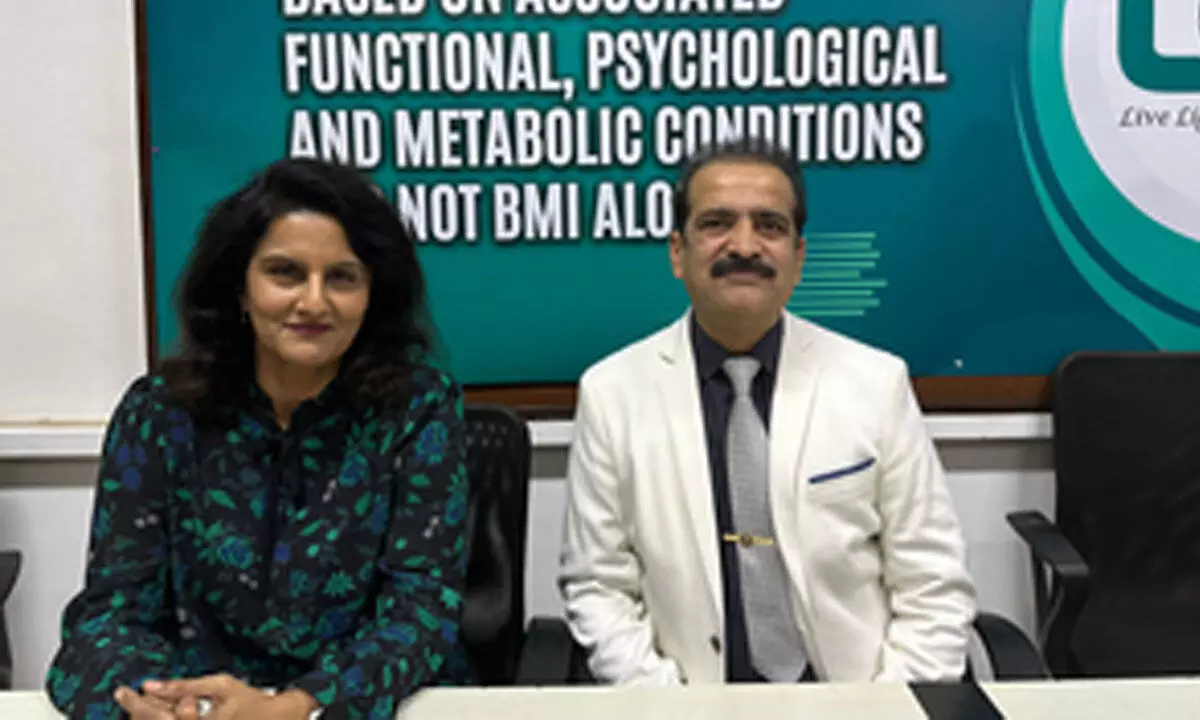As India groans under obesity, experts formulate new guidelines for bariatric surgery
Share :

A team of medical experts have formulated a new set of guidelines to combat the growing health menace of obesity with a call to implement them in the New Year 2024.
Mumbai: A team of medical experts have formulated a new set of guidelines to combat the growing health menace of obesity with a call to implement them in the New Year 2024.
The guidelines for Indian physicians, which go beyond the traditional Body Mass Index (BMI) measure, are based on associated functional, psychological and metabolic conditions of the patients, and is the outcome of the efforts of top endocrinologist, diabetologists, cardiologists, gynaecologists and a bariatric expert.
Unveiling the guidelines before the media, globally acclaimed bariatric surgeon Dr. Shashank Shah and co-author Dr. Neeta R. Deshpande, called upon the medical fraternity to implement them in the coming year for the benefit of patients as these lifestyle problems are assuming pandemic proportions in India.
The study was published in the prestigious Journal of the Association of Physicians of India (JAPI) last month, and has been commended by experts.
Explaining the scenario, Shah said that obesity is the accumulation of excess body fat to the extent that it poses a health risk, pointing out how patients with comorbidities-cum-obesity showed higher mortality during the Covid-19 pandemic.
"We evaluated nationwide data from over 100,000 randomised adults across India to find the prevalence of obesity is 40.3 per cent among Indians, higher among women, urbanites and persons aged over 40," said Shah.
Of the national figures, the highest incidence was reported in South India (46.51 per cent) while the lowest was in East India (32.96 per cent), and it is estimated that the prevalence of obesity will triple by 2040 among Indian adults aged 20-60 years.
Parallel to obesity, the burden of diabetes is also high and increasing globally, mainly fueled by unhealthy lifestyles, as per estimates, more than 77 million Indians suffered from diabetes in 2019, and this number is expected to nearly double to 134 million by 2045, and around 57 per cent of them would remain undiagnosed, said Deshpande.
Shah, an ex-President of the Obesity & Metabolic Surgery Society of India, and other national-global bodies, said that the new guidelines have already been implemented at the international levels and treatment of obesity is based on associated problems.
"India is known as the global capital of diabetes, and it is one of the youngest nations in the world… but obesity and overweight have reached pandemic proportions across the globe today, and India is no exception," said Shah.
This condition is the mother of all metabolic diseases, including cancer, Type 2 diabetes, hypertension, etc., and mechanical disorders such as arthritis of the knees, plus mental disorders such as anxiety and depression, adding enormously to the economic burden to the individual, community, and the country, he said.
As per the guidelines, in India, a person is considered overweight when their BMI is between 23-25 kg/m2, while a person with a BMI over 25 k/m2 is considered obese, said Deshpande.
However, Indians are prone to developing excess belly fat, especially around the internal organs like liver and the pancreas, which can be the starting point for metabolic diseases such as diabetes, also known as visceral obesity or abdominal obesity.
While physical inactivity and aging are largely associated with obesity in India, abdominal obesity in women tends to develop in the 30s and 40s of their life.
"Unfortunately, the Indian population that has abdominal obesity and metabolic syndrome is also at a higher risk for cardiovascular disease, irrespective of their BMI," said Shashank.
He cited the example of a middle-aged, medium height-weight woman with a BMI of 30 kg/m2, but suffering from comorbidities like diabetes, neuropathy, sleep apnea, severe joint pains and painful osteoarthritis of both the knees, breathlessness, was on insulin, her family and emotional life was extremely disrupted.
She underwent a bariatric surgery which cured her diabetes, all pains, breathlessness, life was normalized with her functional capacity increased, her psychological confidence grew and metabolic disorders also improved, he said. "Under the present classification, this patient was not graded as severe obesity, but in our present grading system, her metabolic, functional and psychological disabilities were extremely severe so she would be a patient with Grade 3 or severe obesity, needing aggressive treatment and surgical intervention," said Shah.
Emphasising that bariatric surgery is the last option for those battling unsuccessfully with obesity as diet and exercises fail, he urged the need to follow the revised bariatric surgery guidelines to determine the eligibility of the patients for the procedure.







